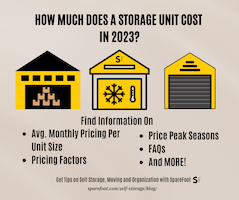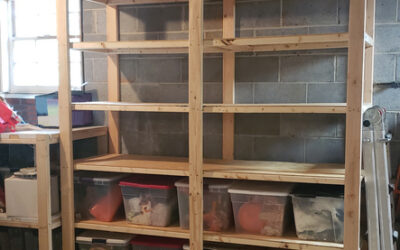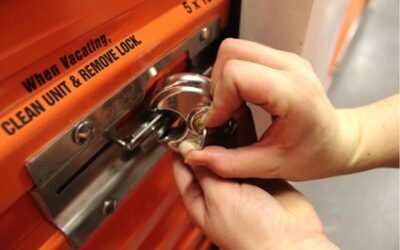Drummer Patrick Drohan and his four mates that make up a fast-rising Southern rock band liked honing their skills in a 10×15 storage unit in Columbia, SC so much, that they named their band after the street where they jammed: Atlas Road Crew.
“It was an awesome experience,” he recalled. “It made us buckle down and get at least good enough to play live.” Now, they tour the East Coast.
What was not so awesome was the toll their non-climate-controlled unit took on their musical instruments.
“In the summer, it was like 120 degrees in there; you felt like you were practicing in a steam room,” Drohan said. “My drumheads would always be out of tune.”
Across the country in Seattle, WA, drummer Keef West of the hard-core band Trial (pictured at top) battled the morning dew in his band’s storage unit.
“The hardest issue for us was humidity,” West said. “The dew would settle all over my rims and drums and pedals, and they’d start to rust.”
Halfway between them, in Oklahoma City, OK, Jordan Bruce, owner of Bruce Music, spends his days overseeing his climate-controlled retail store and instrument storage warehouse while tuning and restoring pianos and other instruments damaged by fire or flood—and the occasional cash-strapped rocker.
“I have people send me pictures all the time of their piano in a storage unit,” Bruce said. “If it’s not climate-controlled and it’s been in there more than two months and the piano is more than 10 to 15 years old, it would cost more to repair it than the piano is worth.”
What’s the best way to protect your musical instruments in storage? Here are four steps to keep the music going.
1. Know the Big 4.
Extreme heat, cold, humidity and dust pose the greatest risks to your instruments—at home, in storage or on the road.
Bruce, who stores up to 80 pianos between his showroom and warehouse, uses humidifiers in the dry Oklahoma winters and dehumidifiers in the damp summers to maintain “our happy numbers of 70 degrees and 42 percent humidity,” he said.
“If temperatures are 75 or 80 degrees outside, you might get away without climate control,” he said. “But if it’s freezing or really hot, you should spend the extra money for it.”
2. Know Your Instruments.
Wooden instruments, including pianos, guitars, violins and cellos, require a bit more care than brass horns or electric keyboards do. That’s because wood is prone to expand in heat and humidity and contract in cold, dry conditions. Pianos can be particularly vulnerable because their wood and metal parts expand at different rates.
3. Know How to Store Them.
Store all instruments in their original cases (if applicable), above ground level toward the center of the self-storage unit, and well away from drafty doors and open vents.
It’s a good idea to release string tension on guitars and other stringed instruments to avoid breaking strings and warping the neck. No need to detune pianos, however; the cast-iron harp or plate is designed to withstand tons of pressure.
For extended storage, wrap your piano, lid, legs, pedals and bench in heavy padding. “Our pads cost us $22 each because they’re really good,” Bruce said. “Cheap rental pads are not going to do the job.”
Baby grand pianos are best stored on their side. Raise uprights off concrete flooring with casters or wooden pallets to minimize temperature fluctuations.
4. Unpack With Care.
The longer you store your instrument, the more care you should take unpacking it. Be especially patient with wooden instruments, especially vintage pianos.
“If it was exposed to too much heat or humidity, it’s possible that older veneer could stick to the pad when you remove it,” Bruce warned.




